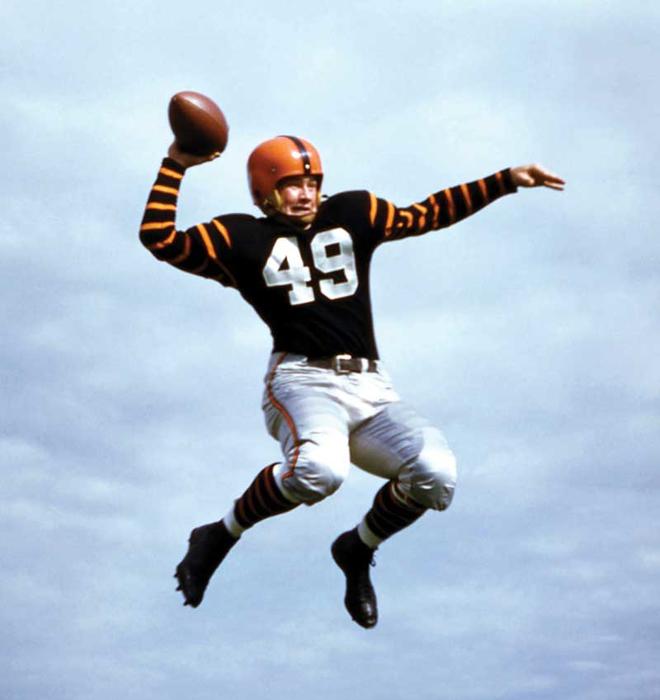
May 4, 1934 – July 31, 2021
In 1955, Royce Flippin Jr. ’56 was, in the words of the New York Herald Tribune, “the most exciting back in the Ivy League.” Swift and versatile, he could cut through defenders or launch passes over them. He also played safety on Princeton’s defense.
Sidelined with a knee injury for much of his senior year, Flippin saved his best for the biggest game, against Yale, when he thrilled the crowd of 46,000 at Palmer Stadium with a third-quarter touchdown run and a handful of other key plays in the Tigers’ 13-0 upset win. After the final whistle, his teammates hoisted him on their shoulders and carried him off the field. (A photo of the scene still hangs in the Cap & Gown Club, where Flippin was a member.)
One could be spoiled by that kind of adulation, but friends say Flippin’s life was defined by lifting up others. As an investor in the early 1970s, he co-founded a socially responsible mutual fund, aiming to boost companies that excelled in civil rights and environmental stewardship. As an athletic director at Princeton and MIT, he expanded access to sports and recreation. He led NCAA committees, served on boards of alumni-founded businesses, and in retirement delivered communion to shut-ins as a lay minister at his church.
“Everyone he met — he made them feel better,” says Tom Meeker ’56, Flippin’s college roommate.
When Flippin returned to Princeton in 1972 as director of athletics, he was “the consummate cheerleader,” according to Merrily Dean Baker, Princeton’s top administrator for women’s sports at the time. His sons, Royce III ’80 and Bob ’83, remember tagging along as their dad traversed the campus, going from game to game.
“He had a very pure view of athletics,” says Royce III. “As successful as he was, he saw athletics as something for everyone.”
That perspective served Flippin well during a brief but influential era in Jadwin Gym’s corner office. Coeducation and the passage of Title IX brought rapid expansion in women’s athletics. Princeton had six women’s varsity teams when Flippin arrived. Four more debuted by the time he stepped down in 1979, and two others were in the works.
At that point, more than a third of undergraduates were participating in intercollegiate athletics (including freshman and junior varsity teams), and Princeton had the highest overall winning percentage in the Ivy League. If there was one blot on Flippin’s record, it was football: He fired two coaches in six years, and the Tigers never had a winning season on his watch.
As Baker recalls, the early women’s teams had a long way to go to reach equal footing. They traveled on a shoestring, shared uniforms, and faced resistance from the more established men’s programs. But when Baker went to speak with a reticent men’s coach or raise money from alumni groups, Flippin was often at her side.
“He was an excellent advocate,” Baker says. “He was on board, right from the beginning.”
Brett Tomlinson is PAW’s managing editor.
Watch Princeton with Royce Flippin ’56 defeat Yale in 1955:






1 Response
George H. Scragg Jr. ’56
3 Years AgoAn Over-the-Top Talent
The 1956 classmates of Royce were all uniquely privileged to have seen him play for three years — and especially to witness his storied three wins vs. Yale.
Of interest, athletic department trainers were assigned on an annual rotating basis to Princeton’s varsity teams. As a member of the varsity hockey team, I can report that each trainer assigned to us for three years was of the opinion that Royce was an even better player than Richard Kazmaier ’52, winner of the Heisman Trophy!
In addition, it was well known that coach Charlie Caldwell 1925 called Royce, who played both defense and offense, one of the most versatile players he’d ever coached.
Maybe just opinions, but they both speak to Royce’s over-the-top excellence as a football player.